-
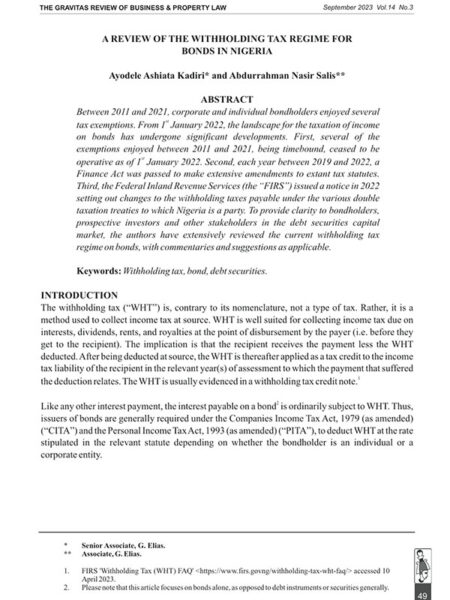
A Review of the Withholding Tax Regime for Bonds in Nigeria
0₦2,500.00Ayodele Ashiata Kadiri and Abdurrahman Nasir Salis, in their article, A Review of the Withholding Tax Regime for Bonds in Nigeria, examine the withholding tax regime for bonds in Nigeria. They underscore the state of tax exemptions for bondholder between 2011 and 2021. However, from 1st January 2022, the landscape for the taxation of income on bonds has undergone significant developments. First, a number of the exemptions enjoyed between 2011 and 2021, being time bound, ceased to be operative as of 1st January 2022. Second, each year between 2019 and 2022, a Finance Act was passed to make extensive amendments to extant tax statutes. Third, the Federal Inland Revenue Services (the “FIRS”) issued a notice in 2022 setting out changes to the withholding taxes payable under the various double taxation treaties which Nigeria is a party to. In order to provide clarity to bondholders, prospective investors and other stakeholders in the debt securities capital market, the authors have extensively reviewed the current withholding tax regime on bonds, with commentaries and suggestions as applicable.
-
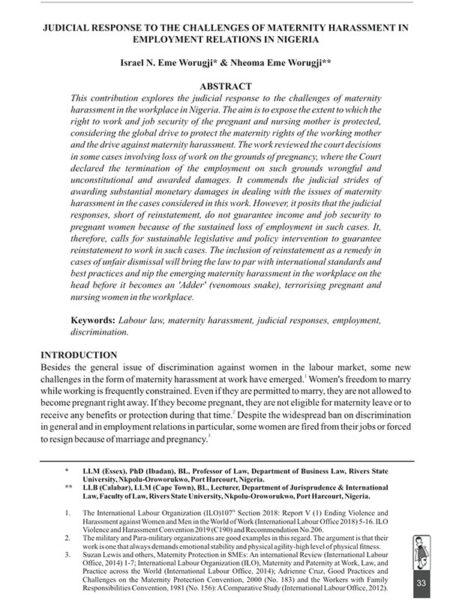
Judicial Response to the Challenges of Maternity Harassment in Employment Relations in Nigeria
0₦2,500.00Professor Israel Worugji & Nheoma Worugji in their article, Judicial Response to the Challenges of Maternity Harassment in Employment Relations in Nigeria, revisit the issues of maternity harassment in the workplace. Their contribution explores the judicial response to the challenges of maternity harassment in the workplace in Nigeria. The aim is to expose the extent to which the right to work and job security of the pregnant and nursing mother is protected, considering the global drive to protect the maternity rights of the working mother and the drive against maternity harassment in particular. The work reviewed the court decisions in some cases involving loss of work on the grounds of pregnancy, where the court declared the termination of the employment on such grounds wrongful and unconstitutional and awarded damages. It commends the judicial strides of awarding substantial monetary damages in dealing with the issues of maternity harassment. However, it posits that the judicial responses, short of reinstatement, do not guarantee income and job security to pregnant women because of the sustained loss of employment in such cases. It, therefore, calls for sustainable legislative and policy intervention to guarantee reinstatement to work in such cases.
-
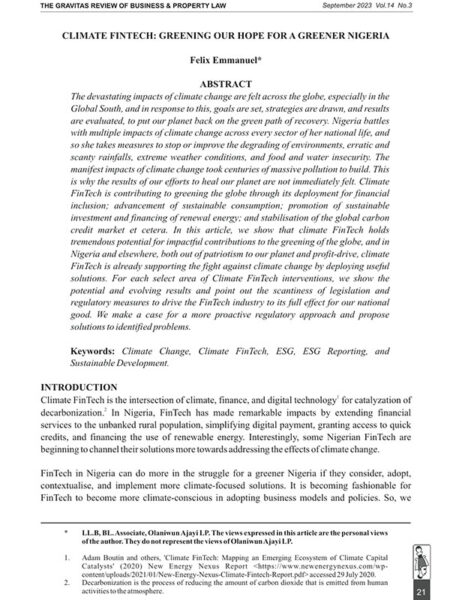
Climate Fintech: Greening Our Hope For A Greener Nigeria
0₦2,500.00Felix Emmanuel, in his article Climate Fintech: Greening Our Hope For A Greener Nigeria, unravels the relationship between the activities of fintechs and climate change. It shows that climate FinTech holds tremendous potentials of impactful contributions to the greening of the globe. It underscores the how climate FinTech are already supporting the fight against climate change by deploying useful solutions. For select areas of Climate FinTech interventions, the paper demonstrates the potentials and evolving results and point out the scantiness of legislation and regulatory measures to drive the FinTech industry to its full effect for our national good. Emmanuel makes a case for a more proactive regulatory approach and propose solutions identified problems.
-
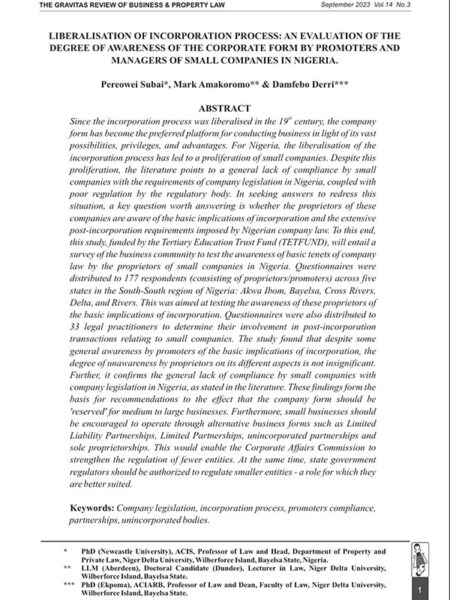
Liberalisation of Incorporation Process: An Evaluation of the Degree of Awareness of the Corporate Form by Promoters and Managers of Small Companies in Nigeria
0₦2,500.00Professor Pereowei Subai, Mark Amakoromo and Professor Damfebo Derri, in their article, Liberalisation of Incorporation Process: An Evaluation of the Degree of Awareness of the Corporate Form by Promoters and Managers of Small Companies in Nigeria, query the liberalisation of the incorporation process that has led to a proliferation of small companies. Backed by a field study, funded by the Tertiary Education Trust Fund (TETFUND), the authors postulate that despite some general awareness by promoters of the basic implications of incorporation, the degree of unawareness by proprietors on its different aspects of corporate personality is not insignificant. Further, the study confirms the general lack of compliance by small companies with company legislation in Nigeria. These findings form the basis for recommendations to the effect that the company form should be ‘reserved’ for medium to large businesses. Furthermore, small businesses should be encouraged to operate through alternative business forms such as Limited Liability Partnerships, Limited Partnerships, unincorporated partnerships and sole proprietorships. This would enable the Corporate Affairs Commission to strengthen the regulation of fewer entities. At the same time, state government regulators should be authorized to regulate smaller entities – a role for which they are better suited.
-
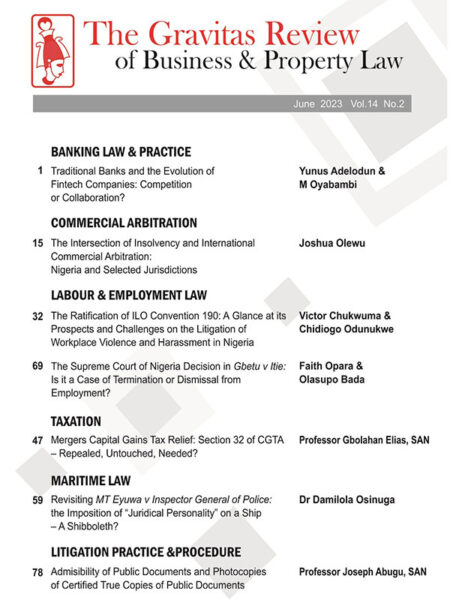
The Gravitas Review of Business & Property Law Vol.14 No.2 – Print
0₦5,000.00In this issue of The Gravitas Review of Business & Property Law Vol.14 No.2, there are well researched articles on:
- Banking Law
- Commercial Arbitration
- Labour & Employment Law
- Taxation
- Maritime Law
- Litigation Practice & Procedure
-

The Gravitas Review of Business & Property Law Vol.14 No.2 – E-Book
0₦5,000.00In this issue of The Gravitas Review of Business & Property Law Vol.14 No.2, there are well researched articles on:
- Banking Law
- Commercial Arbitration
- Labour & Employment Law
- Taxation
- Maritime Law
- Litigation Practice & Procedure
-

The Gravitas Review of Business & Property Law Vol.14 No.2
0₦5,000.00In this issue of The Gravitas Review of Business & Property Law Vol.14 No.2, there are well researched articles on:
- Banking Law
- Commercial Arbitration
- Labour & Employment Law
- Taxation
- Maritime Law
- Litigation Practice & Procedure
-

Admissibility of Public Documents and Photocopies of Certified True Copies of Public Documents
0₦2,500.00Professor Joseph Abugu, SAN, in this article, Admissibility of Public Documents and Photocopies of Certified True Copies of Public Documents, examines two critical vexed issues on the admissibility of public documents. The first interrogates what qualifies as a public document within the provisions of the Evidence Act 2011. The second addresses the admissibility of photocopies of certified true copies of public documents. Professor Abugu posits that the essential quality of a public document must be ascertained by a conjunctive reading of sections 102 and 104 of the Evidence Act which specifies that the document must be one being kept under legal obligation by a public authority with open access by members of the public who seek to obtain a copy thereof and that routine communications of government agencies and statutory bodies do not so qualify. He also finds that the current exposition of the law on the admissibility of photocopies of certified true copies of public companies is as articulated in the 1969 decision of the Supreme court in Minister of Lands v. Azikiwe (SC) as applied in Ogboru v. Uduaghan (CA) and affirmed by the Supreme Court in Emeka v. Chuba-Ikpeazu & Ors. and in Oboh & Anr v. FNL Ltd.
-

Revisiting MT Eyuwa vs. Inspector General of Police: The Imposition of “Juridical Personality” on a Ship – A Shibboleth?
0₦2,500.00Dr. Osinuga, in his article, Revisiting MT Eyuwa vs. Inspector General of Police: The Imposition of “Juridical Personality” on a Ship – A Shibboleth? revisits the legal concept of ascribing legal personality to a ship in the light of the recent decision of the Nigerian Court of Appeal in MT Eyuwa v Inspector General of Police, that a ship has legal personality. The article suggests that the concept of a vessel’s legal personality may have been misunderstood by the appellate court.
-
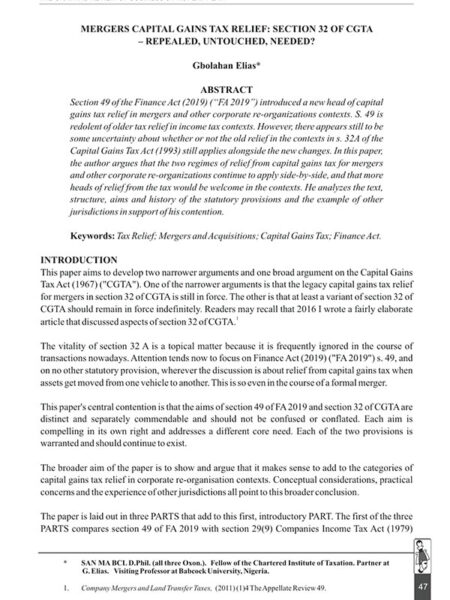
Mergers Capital Gains Tax Relief: CGTA Section 32A — Repealed, Untouched, Needed?
0₦2,500.00Professor Gbolahan Elias, SAN, Principal G.E. Elias & Co. in his article, Mergers Capital Gains Tax Relief: CGTA Section 32A — Repealed, Untouched, Needed? revisits the issue of Capital Gains Tax Reliefs in mergers and acquisitions. He explains the ambit of Section 49 of the Finance Act (2019) (“FA 2019”) which introduced a new head of capital gains tax relief in mergers and other corporate re-organizations contexts. He compares the provision with section 49 in the 1993 Capital Gains Tax Act and identifies ambiguity about whether or not the old relief in the contexts in Section 32A of the Capital Gains Tax Act (1993) still applies alongside the new changes. Professor Elias argues that the two regimes of relief from capital gains tax for mergers and other corporate re-organizations continue to apply side-by-side, and that more heads of relief from the tax would be welcomed. He analyzes the text, structure, aims and history of the statutory provisions and the example of other jurisdictions in support of his contention.
-

The Supreme Court of Nigeria Decision in Gbetu V. Itie: Is It a Case of Termination or Dismissal from Employment?
0₦2,500.00Faith Opara and Olasupo Bada in their case review article, The Supreme Court of Nigeria Decision in Gbetu V. Itie: Is It a Case of Termination or Dismissal from Employment? examine the decision of the Supreme Court in Gbedu v. Itie that employees’ whose employment was brought to an end by liquidation were by this token, dismissed from the employ of the liquidated company. Relying on primary and secondary data, they examine the propriety of this decision in the light of the legal connotation of termination and dismissal from employment. Opara and Bada examine the meaning and legal effect of termination and dismissal from employment under Nigerian labour jurisprudence and found that the decision was reached per incuriam. Therefore, lower courts are urged to distinguish and depart from the decision when faced with similar situation while the SCN is urged to overrule itself where the opportunity present itself subsequently.
-
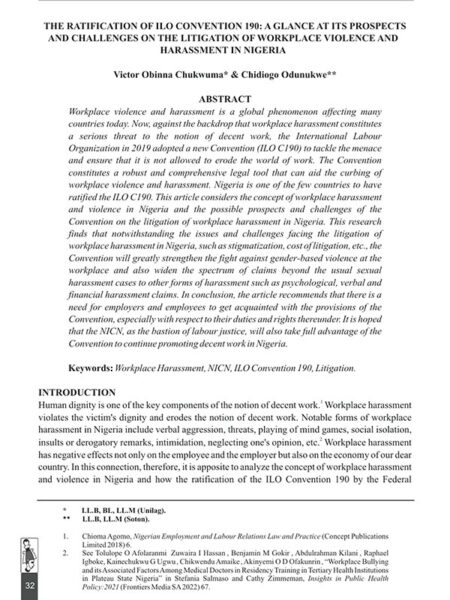
The Ratification of ILO Convention 190: A Glance at its Prospects and Challenges on the Litigation of Workplace Violence and Harassment in Nigeria
0₦2,500.00Victor Chukwuma and Chidiogo Odunukwe in their article, The Ratification of ILO Convention 190: A Glance at its Prospects and Challenges on the Litigation of Workplace Violence and Harassment in Nigeria, explore the ambit of workplace violence and harassment as a global phenomenon and the ILO’s adoption of a new Convention (ILO C190) in 2019 to specifically tackle the menace and to ensure that it is not allowed to erode the world of work. They consider the possible prospects and challenges of the Convention on the litigation of workplace harassment in Nigeria. They find that notwithstanding the issues and challenges facing the litigation of workplace harassment in Nigeria, the Convention will greatly strengthen the fight against gender-based violence at the workplace and also widen the spectrum of claims beyond the usual sexual harassment cases to other forms of harassment. They recommend that there is need for employers and employees to get acquainted with the provisions of the Convention especially with respect to their duties and rights thereunder.
The Gravitas Review of Business & Property Law



